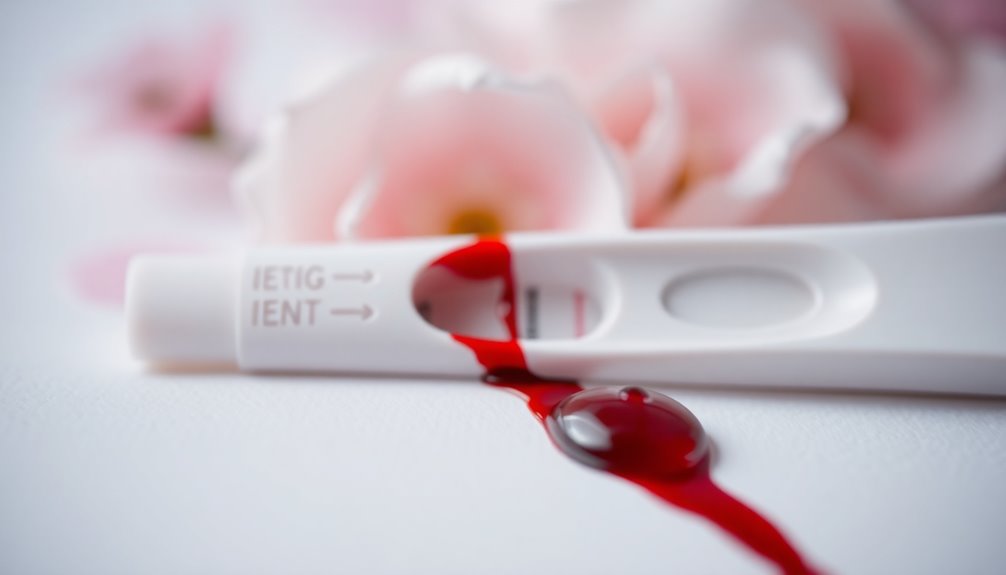Experiencing menstruation-like bleeding during pregnancy can be shocking, but you're not alone—15-25% of women encounter this in early stages. It could be due to implantation bleeding, hormonal changes, or even miscarriage. If the bleeding is heavy or accompanied by severe cramping, it's essential to contact your healthcare provider immediately. Understanding the nature of the bleeding and accompanying symptoms can help you manage your health better. Curious about what to look out for? There's more to uncover.
Key Takeaways
- Menstruation-like bleeding in early pregnancy may indicate implantation bleeding, but it can also signal potential complications needing medical attention.
- Heavy bleeding during pregnancy could suggest a miscarriage or other serious conditions like placenta previa or placental abruption.
- Light spotting may occur due to hormonal changes or cervical sensitivity, but any significant bleeding should be reported to a healthcare provider.
- Monitoring the color, amount, and timing of bleeding is crucial to assess the situation and determine if urgent care is needed.
- Always seek immediate medical advice if experiencing bright red blood, clots, or bleeding accompanied by severe cramping or abdominal pain.
Understanding Bleeding During Pregnancy

Understanding bleeding during pregnancy can be concerning, especially since it happens to 15-25% of women in early stages.
Spotting, which is often light and may not require a pad, can occur due to various reasons like implantation bleeding. This typically happens between 10-14 days after conception and appears as light pink or rust-colored blood.
Spotting, often light and color variations like pink or rust, may indicate implantation bleeding 10-14 days post-conception.
However, heavier bleeding is a different story. If you experience this, it's essential to contact your healthcare provider immediately, as it may signal serious conditions like miscarriage or ectopic pregnancy.
Always monitor the color, amount, and timing of any bleeding, and report all instances to your provider for proper evaluation. Understanding these signs helps guarantee you're addressing any potential health problems effectively.
Common Causes of Early Pregnancy Bleeding

Bleeding in early pregnancy can stem from several common causes, and recognizing them is vital for your health.
Here are some potential causes of early pregnancy bleeding you should be aware of:
- Implantation bleeding: This light spotting occurs when the fertilized egg attaches to the uterine lining.
- Hormonal changes: Changes in hormones and cervical sensitivity can lead to light spotting in the first trimester.
- Miscarriage: Unfortunately, this can occur in about 1 in 5 pregnancies.
- Infections: Vaginal infections can also result in bleeding during pregnancy and need evaluation.
If you experience any vaginal bleeding, no matter how slight, it's important to report it to your healthcare provider for proper assessment and care.
Identifying Bleeding in the Second and Third Trimesters

After the first trimester, any bleeding can signal more serious issues that require immediate attention.
In the second and third trimesters, bleeding during pregnancy may indicate conditions like placenta previa, where the placenta covers the cervix, or placental abruption, which involves the placenta detaching from the uterus. Both situations can lead to heavy bleeding and require urgent care.
You should also be aware of symptoms of preterm labor, such as cramping, lower back pain, and increased vaginal pressure, often accompanied by bleeding.
While light spotting can occur due to cervical changes or infections, significant or persistent bleeding should always prompt a call to your healthcare provider for evaluation.
Don't hesitate to seek help if you're concerned.
What Does Normal Bleeding Look Like?

During pregnancy, normal bleeding, often called spotting, can be a common occurrence. This light spotting isn't enough to fill a pad or tampon and may appear pink, red, or dark brown. Understanding what normal bleeding looks like is vital for your peace of mind.
Normal spotting during pregnancy can appear pink, red, or dark brown, providing reassurance when understood correctly.
- Implantation bleeding occurs around days 10-14 after conception and lasts a few hours to a few days.
- Unlike menstrual bleeding, it's lighter and doesn't contain clots.
- Spotting may happen after sexual intercourse or pelvic exams due to increased blood flow to the cervix.
- Always monitor any bleeding during pregnancy and report to a provider, even if it seems minor.
It's important to keep your healthcare provider informed for proper evaluation and reassurance.
Treatment Options for Bleeding During Pregnancy

When you experience bleeding during pregnancy, it's essential to monitor your symptoms closely and stay in touch with your healthcare provider.
Rest and hydration are often recommended, along with avoiding heavy lifting and sexual intercourse.
Depending on the situation, your doctor might suggest medication or further interventions to guarantee both your health and that of your baby.
Monitoring Bleeding Symptoms
How can you guarantee a healthy pregnancy if you experience any bleeding symptoms? Monitoring is key. Always report any bleeding—especially light bleeding or spotting in the first trimester—to your healthcare provider. They'll help determine the cause and make sure you and your baby are safe.
Here are some important steps to follow:
- Rest and avoid strenuous activities.
- Stay hydrated to support your body.
- Refrain from sexual intercourse until cleared by your provider.
- Seek immediate care if you experience heavy bleeding.
Recognizing the difference between light bleeding and heavy bleeding is essential, as heavy bleeding may indicate serious issues like miscarriage or ectopic pregnancy.
Your proactive approach can make a significant difference in your pregnancy's health.
Medication and Rest Recommendations
Experiencing any bleeding during pregnancy can be alarming, but there are effective treatment options that can help manage the situation.
Your healthcare provider might prescribe medication, like progesterone, to stabilize your pregnancy and reduce bleeding, especially if you have a history of miscarriage.
It's important to prioritize rest and hydration during this time. Avoid sexual intercourse, heavy lifting, and strenuous activities to minimize risks.
Regular monitoring by your healthcare provider is vital, as they may conduct ultrasounds and blood tests to assess the cause and severity of the bleeding.
In severe cases, hospitalization may be necessary for closer observation and potential medical intervention to guarantee both your health and that of your fetus.
Healthcare Provider Consultation
Why is it vital to consult a healthcare provider if you notice menstruation-like bleeding during pregnancy?
It's important for evaluating potential complications like miscarriage or ectopic pregnancy. By contacting a healthcare provider, you can explore treatment options and guarantee the safety of both you and your baby.
Your healthcare provider might recommend:
- Monitoring through ultrasounds to check fetal well-being
- Blood tests to evaluate hormone levels and bleeding severity
- Rest and hydration to support your body
- Avoiding sexual activity or heavy lifting to prevent further complications
In some cases, they may prescribe progesterone to help stop the bleeding.
If the bleeding is severe, hospitalization for close monitoring may be necessary.
Don't hesitate—your health matters!
When to Seek Medical Attention

If you're experiencing heavy bleeding that soaks through a pad or panty liner, you need to contact your healthcare provider right away.
Pay attention to any severe cramping, abdominal pain, or dizziness, as these symptoms could indicate serious issues.
Also, if you notice changes in the color or flow of light spotting, it's best to consult your healthcare provider for guidance.
Heavy Bleeding Concerns
While some bleeding can be normal during pregnancy, heavy bleeding is a serious concern that shouldn't be ignored. If you experience heavy bleeding, it may indicate a miscarriage or other complications.
Be sure to seek urgent care if you notice:
- Bleeding that fills a pad within an hour
- Large clots in the blood
- Severe abdominal pain or cramping
- Dizziness or fainting
If you're in your first trimester and experiencing spotting or bleeding, don't hesitate to contact your healthcare provider.
Any vaginal bleeding after the first trimester should also be reported, as it could signal issues like placenta previa or preterm labor.
Monitoring the amount and duration of your bleeding is essential for your health.
Accompanying Pain Symptoms
Experiencing menstruation-like bleeding during pregnancy can be alarming, especially when it's accompanied by pain.
If you notice heavy bleeding along with severe cramping or abdominal pain, it's essential to seek medical attention immediately, as these symptoms may indicate a miscarriage or ectopic pregnancy.
Any bleeding paired with pain in your belly or pelvis warrants an urgent call to your healthcare provider to guarantee both your health and that of your baby.
Keep an eye on the amount and color of the bleeding; bright red blood or clots combined with pain can signal serious issues that require immediate intervention.
Don't hesitate—your health and your baby's well-being depend on prompt action.
Changes in Discharge
What changes in discharge should you be aware of during pregnancy? It's important to monitor any noticeable alterations, as they can indicate various conditions.
While a clear or white discharge is normal, keep an eye out for:
- Bleeding or spotting: Light pink or dark brown can be normal, especially early on.
- Increased volume: A sudden change may warrant attention.
- Color changes: Yellow or green could suggest an infection.
- Unpleasant odor: Foul smells with itching or burning require immediate contact with a healthcare provider.
Always track the characteristics of your discharge, as this information can be essential for your healthcare provider if changes occur. Additionally, being aware of common symptoms can help you identify any potential issues early on.
Don't hesitate to reach out if you have concerns about your changes in discharge.
Questions to Discuss With Your Healthcare Provider

When you notice menstruation-like bleeding during pregnancy, it's crucial to ask your healthcare provider specific questions to understand what's happening.
Inquire about the potential causes of your bleeding, including whether it could be implantation bleeding or something more serious like a miscarriage or ectopic pregnancy.
Understanding the potential causes of your bleeding is essential, including the possibility of implantation bleeding versus more serious conditions like miscarriage or ectopic pregnancy.
Ask how to differentiate between normal spotting and concerning bleeding by focusing on color, amount, and duration.
Discuss what steps to take if the bleeding worsens or if you experience cramping, dizziness, or severe pain.
Request information on monitoring your pregnancy health and when to seek immediate medical attention.
Finally, explore treatment options available based on the cause of the bleeding, such as progesterone therapy or additional supportive care.
Frequently Asked Questions
Has Anyone Had Periods Like Bleeding and Still Been Pregnant?
Yes, many people have experienced bleeding that resembles a period and still had a healthy pregnancy.
This can happen due to implantation bleeding or hormonal changes early on. About 15-25% of pregnant individuals report some spotting during their first trimester.
However, it's important to monitor any bleeding and contact your healthcare provider. They can help determine the cause and guarantee everything's progressing well for you and your baby.
Why Am I Bleeding Like I'm on My Period but I'm Pregnant?
You might be feeling alarmed by bleeding that mimics your period while you're pregnant.
It's not uncommon; many experience light spotting due to hormonal shifts or implantation bleeding.
However, if the bleeding is heavy or accompanied by pain, it's essential to act quickly.
This could signal something serious, like a miscarriage or ectopic pregnancy.
Keep track of the bleeding's details and reach out to your healthcare provider for guidance and peace of mind.
Can You Get Pregnant and Still Bleed Like a Period?
Yes, you can experience bleeding that resembles a period while pregnant. This bleeding, often caused by factors like implantation or hormonal changes, can sometimes mislead you.
It's crucial to recognize that about 15-25% of pregnant individuals notice this type of bleeding early on.
However, if you do bleed, keep an eye on its characteristics and flow. Always consult your healthcare provider to verify everything's okay and rule out any potential complications.
Can Bleeding Like Period Be a Positive Pregnancy Test?
Can bleeding that feels like your period mean you're pregnant? Yes, it can! If you've taken a pregnancy test and it's positive, that indicates the presence of the hCG hormone, regardless of any bleeding. Many people experience some bleeding during early pregnancy, which might be lighter and different in color than a typical period. However, it's always best to consult your healthcare provider for guidance and to verify everything's okay.
Conclusion
To sum up, while experiencing menstruation-like bleeding during pregnancy can feel like a scene straight out of a drama series, it's crucial to stay calm and informed. Understanding the possible causes and recognizing what's normal can help you navigate this confusing time. Always trust your instincts—if something feels off, don't hesitate to reach out to your healthcare provider. They're your best ally in ensuring a healthy pregnancy, even when the plot twists are unexpected!









